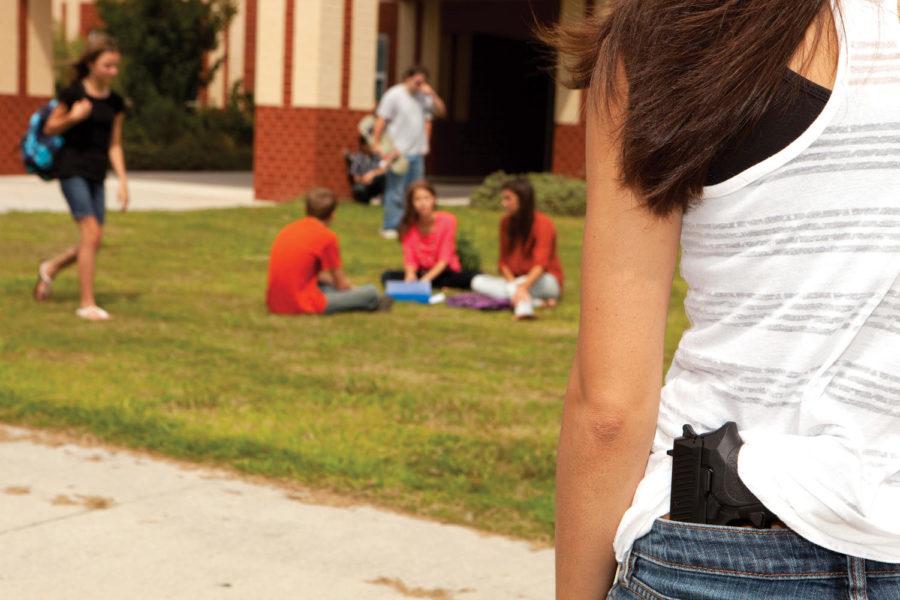Henry: Guns in the classroom detract from learning
Guns near schools and classrooms would take attention away from teaching and the students, and could even be a constant reminder to students that their school is unsafe. Columnist Katie Henry argues that gun laws should be left to individual states instead of national legislators.
March 13, 2013
In light of recent tragedies and gun control debates, aspiring teachers are beginning to rethink their desire to become an educator. However, it’s not the fear of experiencing tragedies such as Sandy Hook that is holding them back. It’s the fear of being required to carry a firearm while on the job. Public opinion on the topic is almost evenly divided: 58 percent support teachers being able to have guns in the classroom and 42 percent do not.
Several states, including Mississippi, are working on legislation that would require a certain number of teachers to carry a concealed weapon. The bill in Mississippi will require two teachers or staff members in schools to carry guns. Current Mississippi code states that possession of a gun on school property, whether or not it’s concealed, is a felony. New legislation will allow schools to designate two school workers to carry weapons on school grounds, provided they pass firearm safety measures.
On March 8, 2013, South Dakota became to first state to pass a law authorizing school employees to carry concealed guns into the classroom.
Legislation in other states such as South Dakota will be placing armed guards in schools or give teachers the right to carry weapons. Rep. Lester Carpenter, who introduced this new legislation, says that this will allow school districts to protect themselves. His opposition, Sen. Jeff Flake, criticizes this legislation and said that decisions on school security should be made at the local level and should not be part of national legislation.
The NRA has repeatedly proposed placing a guard in every school to prevent shootings. However, Columbine High School had armed guards, and despite crossfire in exchange with the shooter, it did not prevent that school shooting. That’s why the debate around heightening school security has been such a heated debate. Is putting the lives of students at risk worth adding more security?
Legislation should be more focused on creating adequate training for teachers instead of requiring them to possess firearms on the job. Along with that, teachers don’t feel comfortable compromising the classroom atmosphere or creating potentially dangerous situations for their students. This isn’t to put blame on a teacher’s shoulders by any means, but regardless of the situation, having firearms in the classroom takes away from the learning environment and puts students’ lives at risk.
There’s only so much that can be done to train and prepare for events such as the school shooting. Even if teachers carrying guns are meant for protection, it would be an ever-present reminder to students that they aren’t in a safe environment. But then again, there’s also a risk that someone could even accidentally shoot themselves during training. It’s an issue that schools and legislatures need to be extremely careful deciding upon.
This matter is less focused on the topic of actual gun control and more of the issue of where you must draw the line when it comes to protecting students. Sensible gun owners that have young children take extreme precautions to conceal their weapons from their children. State legislatures need to be extremely meticulous when combining weapons and education.
Some states, such as South Dakota, have a culture where children start hunting at a young age. Children learn how to use BB guns at age 8, skeet shooting at age 14, and target shoot with semiautomatic rifles. Although this is a culture that is used to the presence of guns, that culture is still completely separate from education.
The likelihood of gun crimes happening is higher in urban areas than rural. That’s why umbrella legislation over the entire country wouldn’t be effective if states already have lower gun crime rates than others. These types of legislation need to be decided by state governments since each state has a completely different culture and gun crime rate.
All in all, gun control laws concerning education should be left to the states. Umbrella legislations are ineffective if each state has different demographics, crime rates, and the like.
It’s understandable if schools who have been faced with tragedy in the past amp up security with armed guards, but putting students’ lives at risk when it’s not necessary is detrimental to their education. Leave this decision making to the respective state politicians who know exactly what their state needs.
————————————————————————————-
Katie Henry is a senior in journalism and political science from Pella, Iowa.

















